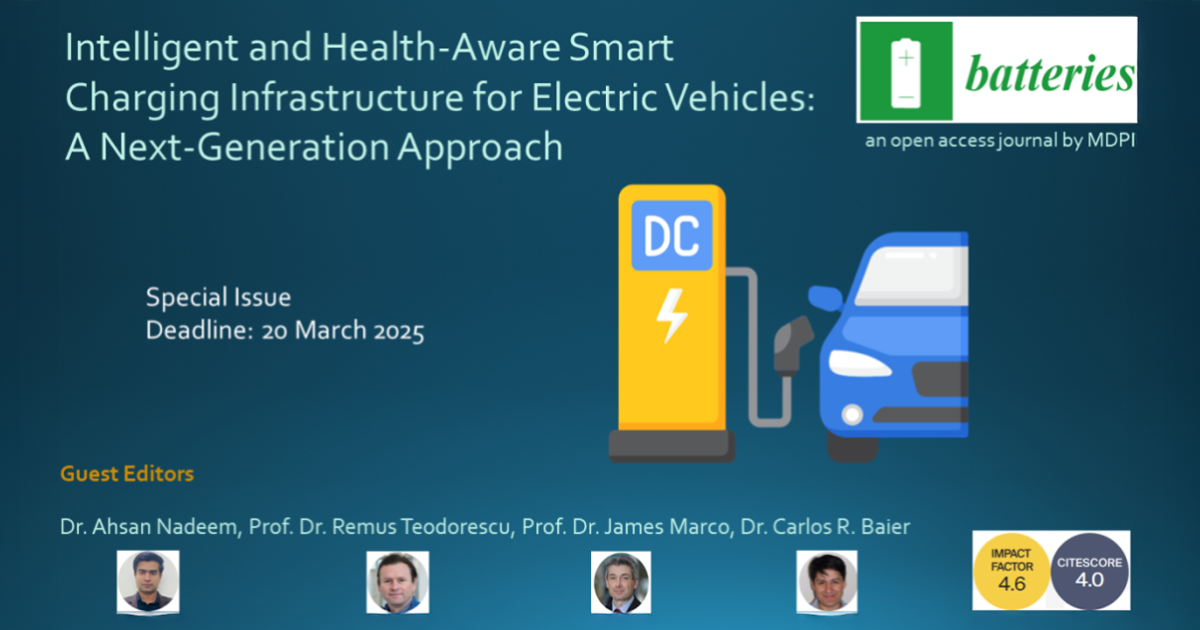Intelligent and Health-Aware Smart Charging Infrastructure for Electric Vehicles: A Next-Generation Approach
A special issue of Batteries (ISSN 2313-0105). This special issue belongs to the section "Battery Modelling, Simulation, Management and Application".
Deadline for manuscript submissions: closed (20 March 2025) | Viewed by 907

Special Issue Editors
Interests: smart battery management; photovoltaic systems; optimization algorithms; power electronics; energy storage
Interests: smart batteries; artificial intelligence; power electronics; electric vehicles; lithium-ion batteries; smart battery management; renewable energy; energy storage
Special Issues, Collections and Topics in MDPI journals
Interests: battery systems engineering; systems modelling; electric vehicles; fast charging; vehicle-to-grid operations; energy storage
Special Issues, Collections and Topics in MDPI journals
Interests: power electronic; power converter; control systems; power quality; power conversion; harmonics
Special Issues, Collections and Topics in MDPI journals
Special Issue Information
Dear Colleagues,
The increasing popularity of electric vehicles (EVs) is driven by the depletion of fossil fuels and growing environmental concerns; however, current EV charging practices can pose significant challenges to the power grid and battery health.
Grid Challenges and Solar Integration: Charging EVs directly from the grid can lead to substantial power consumption, resulting in issues such as harmonics, current distortions, voltage imbalances, and rising peak demand. A solar-based, grid-connected EV charging system can mitigate these problems. However, the power output of solar photovoltaic (PV) systems is influenced by factors such as weather conditions, time of day, and season, necessitating a connection to the electricity grid for consistent power supply. To further address these challenges, hydrogen and buffer battery storage can be used as possible solutions to store excess energy and provide a stable power supply. To enhance the efficiency of this system, it is essential to develop a scheduling algorithm and intelligent energy management system that can manage EV charging based on the availability of PV energy, hydrogen, buffer battery storage, EV data, and grid loading.
Battery Health Concerns and Optimal Charging Strategies: Battery performance degrades with repeated charging and discharging cycles. Fast charging accelerates this process through factors such as elevated temperatures, increased solid electrolyte interface (SEI) layers, lithium plating, and mechanical stress. These issues compromise safety and reduce battery lifespan. Emerging technologies such as lithium manganese iron phosphate (LMFP) and solid-state batteries promise enhanced fast charging performance with reduced degradation; however, a comprehensive understanding of their charging behaviors and the development of optimized charging strategies are necessary to fully exploit their potential and maintain overall battery system reliability. While the demand for rapid charging continues to grow, it is essential to develop optimal charging strategies that balance swift charging times with effective mitigation of degradation processes.
This Special Issue invites contributions on various topics including, but not limited to:
- Algorithms for balancing fast charging speed and battery health;
- Measurement of battery aging parameters under fast charging conditions;
- State of health (SOH) and state of temperature (SOT) estimation/prediction under fast charging;
- Mechanisms and control of SEI film formation during fast charging;
- Fault diagnosis for battery systems under fast charging stress;
- Advanced thermal management techniques for fast charging scenarios;
- Fast charging protocols for different types of battery chemistries;
- Advanced materials and technologies for enhancing fast charging capabilities;
- The impact of fast charging on battery chemistry and material properties;
- The integration of renewable energy sources for fast charging stations;
- The impact of fast charging on grid stability and mitigation techniques;
- Scheduling algorithms to minimize grid impact and charge batteries at lower rates;
- The development of converters that support V2G operations with efficient control mechanisms.
Dr. Ahsan Nadeem
Prof. Dr. Remus Teodorescu
Prof. Dr. James Marco
Dr. Carlos R. Baier
Guest Editors
Manuscript Submission Information
Manuscripts should be submitted online at www.mdpi.com by registering and logging in to this website. Once you are registered, click here to go to the submission form. Manuscripts can be submitted until the deadline. All submissions that pass pre-check are peer-reviewed. Accepted papers will be published continuously in the journal (as soon as accepted) and will be listed together on the special issue website. Research articles, review articles as well as short communications are invited. For planned papers, a title and short abstract (about 250 words) can be sent to the Editorial Office for assessment.
Submitted manuscripts should not have been published previously, nor be under consideration for publication elsewhere (except conference proceedings papers). All manuscripts are thoroughly refereed through a single-blind peer-review process. A guide for authors and other relevant information for submission of manuscripts is available on the Instructions for Authors page. Batteries is an international peer-reviewed open access monthly journal published by MDPI.
Please visit the Instructions for Authors page before submitting a manuscript. The Article Processing Charge (APC) for publication in this open access journal is 2700 CHF (Swiss Francs). Submitted papers should be well formatted and use good English. Authors may use MDPI's English editing service prior to publication or during author revisions.
Keywords
- fast charging
- fast charging speed balancing
- fast charging and battery aging
- fast charging and battery health
- fast charging and thermal management
- fast charging impact
- fast charging stations
- fast charging stress
- fast charging and grid stability
Benefits of Publishing in a Special Issue
- Ease of navigation: Grouping papers by topic helps scholars navigate broad scope journals more efficiently.
- Greater discoverability: Special Issues support the reach and impact of scientific research. Articles in Special Issues are more discoverable and cited more frequently.
- Expansion of research network: Special Issues facilitate connections among authors, fostering scientific collaborations.
- External promotion: Articles in Special Issues are often promoted through the journal's social media, increasing their visibility.
- Reprint: MDPI Books provides the opportunity to republish successful Special Issues in book format, both online and in print.
Further information on MDPI's Special Issue policies can be found here.








